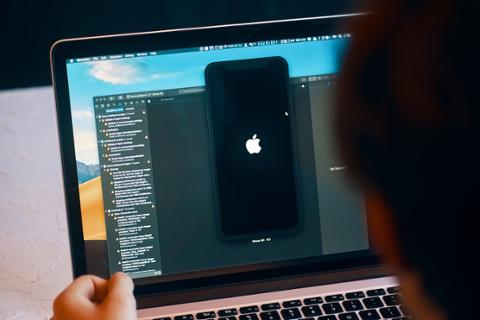It’s the weekend! Before we bring this week to a close, let’s revisit some interesting tech news from the week, including Apple’s latest attempt to make Siri smarter, plus a downright weird device that could forever change how you use screens.
The Incredible, Lickable Screen
Imagine licking your phone screen to determine how something tastes. That’s the potential future offered by an experimental device developed at Meiji University in Japan. This “Taste Display” (known formally as the “Norimaki Synthesizer”) uses color-coded gels (along with an electrical circuit) to artificially replicate taste. “In testing, the Norimaki Synthesizer has allowed users to experience the flavor of everything from gummy candy to sushi without having to place a single item of food in their mouths,” Gizmodo relates.
If this technology catches on, imagine designing apps that replicate taste. Imagine designing UX that gently prods users into licking their smartphone screens. Hey, weirder things have happened.
Apple Tries to Smarten Up Siri
Apple has reportedly purchased Inductiv, a small company that specializes in using machine learning to improve data. According to Bloomberg, Inductiv’s team will work on making Siri, Apple’s voice-activated digital assistant, smarter. Apple itself offered its usual boilerplate statement about acquisitions (“Apple buys smaller technology companies from time to time and we generally do not discuss our purpose or plans.”).
Apple has purchased a number of small firms devoted to machine learning and artificial intelligence (A.I.) over the past few quarters, including Xnor.ai, which specializes in A.I.-related processing on relatively low-power devices (as opposed to powerful computers or datacenters). One of the tech giant’s ultimate goals, of course, is to make Siri competitive with Amazon’s Alexa and Google Assistant, which have collectively seized the voice-activated assistant market through the proliferation of cheap devices such as the Amazon Echo and Google Home.
Unlike Amazon and Google, which collect and utilize massive amounts of consumer information in order to refine their respective A.I. platforms, Apple has privacy policies that limit what it can do with the data its users provide. Apple has hired researchers to help it walk the proverbial tightrope between privacy and superior A.I.; it evidently hopes that buying up A.I. firms will give it even more of an advantage.
Mobile Gaming Hits New Heights
Millions of people, stuck on the couch for months due to the COVID-19 pandemic, have turned to mobile games as a distraction. That’s the conclusion drawn by analyst firms App Annie and IDC, which estimated that weekly game downloads increased 35 percent in March.
Mobile users seem particularly attached to sim, trivial, casual, and adventure games (in that order). Spending on games overall increased 9 percent in the first quarter of 2020. Steam, the popular network for downloading games, saw its usage spike in March and April, while Nintendo is enjoying blockbuster sales of its Switch game console.
For mobile game developers, there’s a lot of opportunity in this massive usage spike. If you’re an aspiring game developer with an idea that you think will prove a big hit with millions of gamers in self-quarantine, you’ll need to master the fundamental skills of game development, including The Unreal Engine and Unity. Those interested in designing mobile games for iOS and Android will also need to know the programming languages for those respective platforms (Swift and Objective-C for iOS; Kotlin and Java for Android).
Have a great weekend, everyone! Remember to keep washing those hands!



